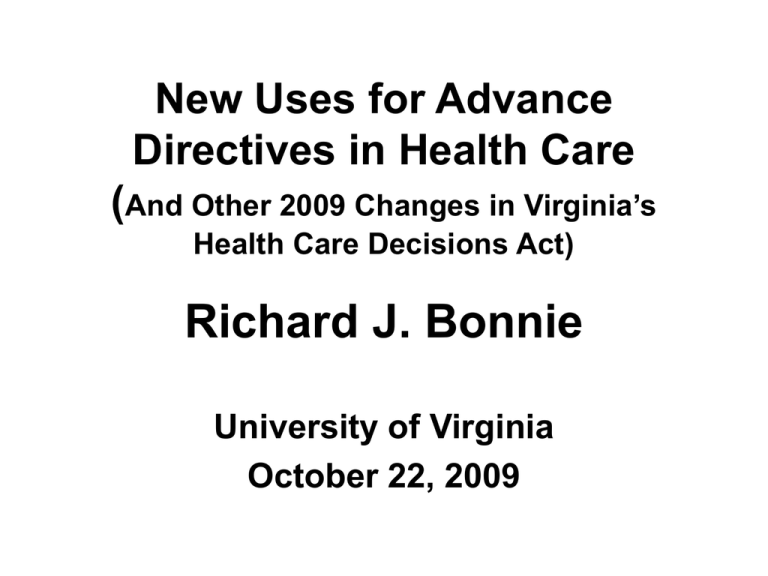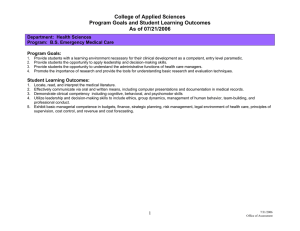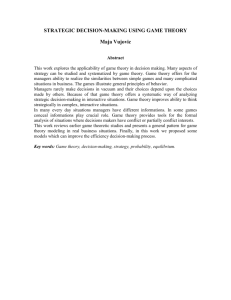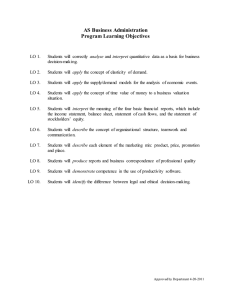Richard Bonnie-Overview
advertisement

New Uses for Advance Directives in Health Care (And Other 2009 Changes in Virginia’s Health Care Decisions Act) Richard J. Bonnie University of Virginia October 22, 2009 Outline • Brief review of innovations in law governing health care decisionmaking over last 30 years • Overview of recent changes in Virginia’s Health Care Decisions Act Two Traditional Models for Decision-making after Incapacity • Advance Directive – exercise of “precedent autonomy” (e.g., wills; contracts and trusts for long-term care) • Surrogate decision-making -“best interests” (e.g., guardianship – with judicial oversight) Innovations in healthcare decisions #1 (“extending precedent autonomy”) • Durable powers of attorney (departure from traditional “agency model” in financial affairs) – VA statute in 1954 • “Living will” statutes to resolve end-of-life treatment dilemmas (Virginia did this in 1983) • Note evolution of modern health care decisions acts: (1) proxy directives and (2) instructional directives • Autonomy-driven model is elegant solution to the growing challenge of deciding when to stop • It has powerful moral force and helps move decisions back to the bedside rather than the courtroom • Propelled by Congress in Patient Self-Determination Act in 1990 after Cruzan Innovations in health care decisions #2 (“default surrogates”) • The problem – most people don’t have ADs • Traditional practices (medical decision-making and family consent) lacked strong legal foundation and were often ethically problematic • Guardianship is costly and cumbersome Innovation in health care decisions #2 (“default surrogates”) • The answer: statutory default list of surrogates, together with substituted judgment/best interests instruction (Virginia did this in 1992) • Profound change – even more so than ADs • Without moral grounding in autonomy, it embraces medical-family decision-making as alternative to guardianship or direct judicial decision-making • [Digression] Note parallel history of surrogate decision-making for people with intellectual disabilities and severe and chronic mental illness Next Steps in Advance Directives • Bolster efforts to facilitate advance planning and agent-designation even when people are uncertain about specific end-of-life preferences • Facilitate instructional directives in contexts other than end-of-life care Facilitate use of advance directives for health care decisions other than end-of-life • Advance directives for mental health care can foster genuine empowerment : 24 states have “PAD” statutes • Other main context is advance planning by patients and families in case of decline in cognitive capacity • Commission on Mental Health Law Reform opposed stand-alone “PAD” statute and appointed Task Force to draft HCDA amendments to facilitate instructional directives for all health care, not only life-prolonging treatment Overview of Revised HCDA: Innovations in Advance Directives • Advance authorization for research participation (as approved by IRB) • Advance authorization for nursing home /long-term care placement • Advance authorization for psychiatric hospitalization (as a non-judicial process) • “Ulysses clauses” – authorizing facility admission and treatment even over later “incompetent” protest Overview of Revised HCDA: Strengthen Capacity Determinations • Presumption of capacity • Capacity determinations are functional and should not be based on diagnosis alone • Encourage more specific and particularized capacity determinations • Require that second assessment (always required) be by physician not involved in patient’s treatment (unless unavailable) • Require provider to notify patient and apparent surrogate • Permit restoration of patient’s decision-making prerogative by single examiner Overview of Revised HCDA: Non-Judicial Options Are Now Available for Surrogates in 2 Situations • Admission to mental health facilities: Guardians may now authorize 10-day admission to mental health facilities if patient lacks decisional capacity and such authority has been conferred in guardianship order • Treatment over “incompetent protest” is allowed (even if not specifically authorized by an AD) if approved by facility ethics committee Unfinished Business • Allow designation of non-relative surrogates (after appropriate inquiry) • To be re-introduced in 2010 Summing Up • 2009 Revision of HCDA takes next steps to improve law and practice in health care decision-making for patients with decisional incapacity – Use ADs to help empower patients to guide health care outside context of end-of-life care – Strengthen and extend procedures for non-judicial capacity determinations and designation of surrogates • Two Important Practice Implications – Provide more opportunities for discussions about advance health care planning in clinical settings – Help improve practice in capacity assessment and default decision-making




